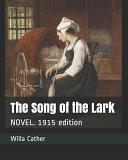Quotes from book
The Song of the Lark

The Song of the Lark is the third novel by American author Willa Cather, written in 1915. It is generally considered to be the second novel in Cather's Prairie Trilogy, following O Pioneers! and preceding My Ántonia .

“Every artist makes himself born. It is very much harder than the other time, and longer.”
Part II, Ch. 3
The Song of the Lark (1915)

Part IV, ch. 1
The Song of the Lark (1915)
Context: The great pines stand at a considerable distance from each other. Each tree grows alone, murmurs alone, thinks alone. They do not intrude upon each other. The Navajos are not much in the habit of giving or of asking help. Their language is not a communicative one, and they never attempt an interchange of personality in speech. Over their forests there is the same inexorable reserve. Each tree has its exalted power to bear.

“There are some things you learn best in calm, and some in storm.”
Thea, in Part VI, Ch. 7
The Song of the Lark (1915)
Context: I keep my mind on it. That's the whole trick, in so far as stage experience goes; keeping right there every second. If I think of anything else for a flash, I'm gone, done for. But at the same time, one can take things in — with another part of your brain, maybe. It's different from what you get in study, more practical and conclusive. There are some things you learn best in calm, and some in storm. You learn the delivery of a part only before an audience.